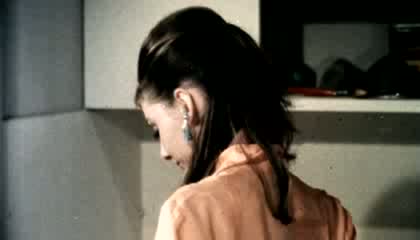Reżyseria:
Blake EdwardsScenariusz:
George AxelrodMuzyka:
Henry ManciniObsada:
Audrey Hepburn, George Peppard, Patricia Neal, Buddy Ebsen, Martin Balsam, José Luis de Vilallonga, John McGiver, Stanley Adams, Elvia Allman, Alan Reed (więcej)VOD (4)
Opisy(1)
Nowy Jork, lata sześćdziesiąte XX wieku. Holly Golightly (Audrey Hepburn) jest lubiącą zabawę dziewczyną, która za nic w świecie nie chce się do niczego i nikogo przywiązywać. Całymi garściami czerpie z życia na koszt bogatych adoratorów. Pewnego dnia do mieszkania piętro wyżej wprowadza się młody, cierpiący na niemoc twórczą pisarz Paul (George Peppard), który także jest utrzymankiem. Szybko zaczyna łączyć ich przyjaźń, która z czasem przeradza się w głębsze uczucie... (HBO)
(więcej)Materiały wideo (1)
Recenzje (8)
Breakfast at Tiffany’s embodies Hollywood at its most classic and at its worst. On the one hand, we have here the magnificently stellar Audrey Hepburn, a narrative with bittersweet tones and precision craftsmanship. On the other hand, there is the absolutely horribly kitschy ending that utterly negates everything that has gone before. All of the potential depth and ambiguity of not only the central character, but also of the whole depiction of the emptiness and artificiality of the American Cinderella story is bluntly trampled underfoot. At its core, or rather in the book on which it’s based, Breakfast at Tiffany’s is actually a precursor to Soderbergh’s The Girlfriend Experience, which the film version could also have been, up until that off-key climax. Only instead of the sense of detachment and cynicism of modern cinema, the bitterness and self-pity of consumer fairy tales shine through the cracks in the superficial carefreeness and the distracted life of the endless party. With a bit of tolerance and a great deal of sympathy, mainly for the iconic Audrey Hepburn, it’s possible to squint at the film and excuse its betrayal of the viewer in the same way that Mickey Rooney’s much-criticised part deservedly did, which unfortunately was the normal or rather dominant way of going about things at that time. Hollywood was overtly racist then, grinding down the edges of everything that stood out, returning distinctive and headstrong female characters, who were largely ground down themselves, into the arms of the masculine hero and delivering false illusions instead of inspiring catharsis.
()
After watching this movie I realized how hard modern romantic movies have it. Then, all it took was one smile of Audrey Hepburn and you were on your way to the movie of the year. Nowadays, the more original the movie with a punchline larger than Beverly Hills, the fewer reasons we have to immediately forget it. But here, I enjoyed more Audreyʼs cat than Audrey herself and since she acted like a douche towards it near the end of the movie, I give Breakfast at Tiffanyʼs three stars.
()
Everyone should see this gem! Audrey Hepburn has always struck me as a lady with everything that goes with it. She's the reason this film has no shortage of wit, originality, and romance. If there's one thing that's got pizzazz, it's this. The final scene in the rain, when Audrey is running and shouting "Cat, cat, caaaat..." is legendary. I love the music, the interiors, the elegant fashion, the haircuts, the gloves... I love Tiffany! And George Peppard is a real man. Breakfast at Tiffany's is one of my all-time favorites.
()
The film version of Breakfast at Tiffany's carries with it certain expectations. Legend speaks of Audrey Hepburn, supposedly the ideal fashion icon, and of course Tiffany jewelry. But fortunately, there's something more important in there: Truman Capote, whose 1958 text, it turns out, is immortal. Unlike this loose film adaptation, which wasn’t very good. I admit that the brief scene of the denied date between Holly and Paul has some merit (especially the destruction of the New York Public Library property), but you can't build an entire film on that one idea. Everything is unnatural, and everything is artificial like the fake highlights Audrey wears in that insufferable bun. The pinnacle of all the sixties kitsch is, of course, the party scene, so typical of the chaos of many other Blake Edwards films. It simply doesn't make sense to set the story of 1943 anywhere else.
()
The great star of world cinema, Audrey Hepburn, was always greatly helped in her career by her fragile appearance, delicate face, and amazing eyes, which she skillfully used to hide the fact that she wasn't such a great actress. Besides the aforementioned advantages, her success also relied on the fact that she was able to choose roles wisely so as not to overexert herself. However, in her filmography, there are much more demanding films than Breakfast at Tiffany's, such as My Fair Lady, or films where she had to demonstrate much more acting talent, such as Wait Until Dark. In the case of her probably most famous film, Breakfast at Tiffany's, I always felt that the film served the viewer not so much with a story, but with Audrey and her charms. It's simply a one-girl show; otherwise, Breakfast at Tiffany's can be considered a mostly average romantic conversation film, which didn't make me laugh once and only slightly touched me in two or three places with its sentimentality. I wanted to give it three stars, but when I revisited the film for the third time, I fell asleep during it, and that shouldn't happen with a three-star film. Overall impression: 45%.
()



Reklama